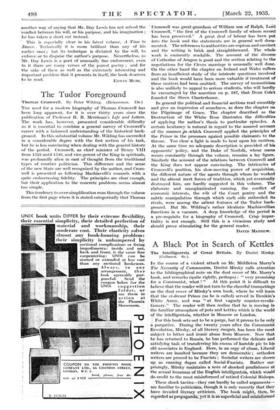The Tudor Foreground Thomas Cromwell. By Peter Wilding. (Heinemann. 158.)
Tim need for a modern iiiography of Thomas Cromwell has been long apparent, for it is over thirty years since the publication of Professor R. B. Merriman's Life and Letters. The work has, however, presented considerable difficulty as it is essential to combine. a -general survey of Cromwell's career with a balanced understanding of the historical back- ground. In this substantial volume Mr. Wilding has succeeded in a considerable degree with the first section of his task, but he is less convincing when dealing with the general history of the period. Cromwell, as chief minister of Henry VIII from 1533 until 1540, and vice-gerent of the King in spirituals, was profoundly alien in cast of thought from the traditional types of courtier politician. This difference and the senae of the new State are well recognized by the author, and Crom- well is presented as following Machiavellrs counsels with -a quite embarrassing fidelity. The principles are clear enough, but their application to the concrete problems seems almost too simple.
This tendency to over-simplification runs through the volume from the first page where it is stated categorically that Thomas 'Cromwell was great-grandson of William son of Ralph, LoiI - Cromwell, " the first of the Cromwell family of whom record has been preserved." A great deal of labour has been put into the book and the statements are in general well docu- . mented. The references to authorities are copious and succinct and the writing is brisk and _straightforward. The whole 'work is eminently readable. The account of the divorce of Catherine of Aragon is good and the section relating to the negotiations for the Cleves marriage is unusually well done. On the other hand the chapter on Ireland and Wales suffers from an insufficient study of the intricate questions involved and the book would have been more valuable if treatment of these matters had been omitted. The survey of monasticism is also unlikely to appeal to serious students, who will hardly be encouraged by the assertion on p. 187, that Dean Colet founded the Sheen Charterhouse.
In general the political and financial sections read smoothly and give an impression of soundness, as does the chapter on the Pilgrimage of Grace. The chapter described as the Destruction of the White Rose illustrates the difficulties of applying the author's thesis to particular episodes. A certain hesitancy is natural in regard to the assured account of the manner 49 Ayhich Cromwell applied the principles of the Prince in the processes against possible claimants to the throne. Too clear alight is made to beat upon his motives. At the same time no adequate description is provided of his opponents' policy, and the Duke of Norfolk, whose name recurs constantly through the volume, remains a lay figure. Similarly the account of the relations between Cromwell and the King does not appear convincing. The intricacies of Cromwell's position, his slow-moving power of acquisition, the different nature of the agents through whom he worked and the almost inert forces of tradition; which yet eventually destroyed him, are hardly suggested in this volume. The elaborate and unsophisticated cunning, the conflict of economic interests, the role of the Court gentry and the subtle manipulation through which each- side embroiled its rivals, were among the salient features of the Tudor back- ground. But Mr. Wilding's rather idealistic Machiavellian functions in a vacuum. A deep knowledge of the period is a pre-requisite for a biography of Cromwell. Crisp impar- tiality is not enough. Still this is a vivacious study and should prove stimulating for the general reader.
DAVID MATHEW.




























































 Previous page
Previous page